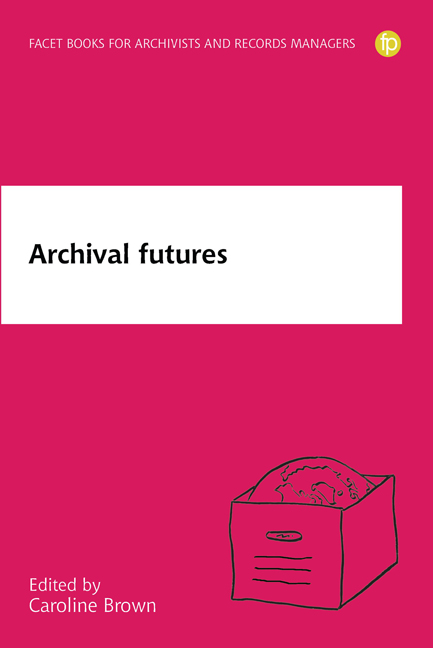Book contents
- Frontmatter
- Dedication
- Contents
- Notes on contributors
- Introduction
- 1 It's the end of the archival profession as we know it, and I feel fine
- 2 Whose truth? Records and archives as evidence in the era of post-truth and disinformation
- 3 The future of archives as networked, decentralised, autonomous and global
- 4 Can we keep everything? The future of appraisal in a world of digital profusion
- 5 Frames and the future of archival processing
- 6 Access technologies for the disruptive digital archive
- 7 Multiple rights in records: the role of recordkeeping informatics
- 8 The accidental archive
- 9 The end of archival ideas?
- Index
Introduction
Published online by Cambridge University Press: 01 June 2019
- Frontmatter
- Dedication
- Contents
- Notes on contributors
- Introduction
- 1 It's the end of the archival profession as we know it, and I feel fine
- 2 Whose truth? Records and archives as evidence in the era of post-truth and disinformation
- 3 The future of archives as networked, decentralised, autonomous and global
- 4 Can we keep everything? The future of appraisal in a world of digital profusion
- 5 Frames and the future of archival processing
- 6 Access technologies for the disruptive digital archive
- 7 Multiple rights in records: the role of recordkeeping informatics
- 8 The accidental archive
- 9 The end of archival ideas?
- Index
Summary
It is into the future we go, to-morrow is the eventful thing for us H. G. Wells, The Discovery of the Future (1913, 19)
In his 1902 lecture to the Royal Institution, The Discovery of the Future, H. G. Wells argued that the future was knowable. There were, he said, two types of mind: one, common to the majority, which scarcely thinks of the future at all and one which thinks constantly of things to come. For the former ‘life is simply to reap the consequences of the past’ but for the latter ‘life is to prepare for the future’ (Wells, 1913, 6). It is not surprising, he believed, that most people look to the past in all its familiarity and relative certainty rather than face the future and wander ‘like a lost child in the blankness of things to come’ (Wells, 1913, 21). For Wells, however, while our individual fates might not be clear, an inductive knowledge of human destiny is possible and we should ‘aspire to, and discover and use’ (Wells, 1913, 40) an understanding of our shared future.
Thirty years ago, Hugh A. Taylor, in his article ‘Transformation in the Archives: Technological Adjustment or Paradigm Shift?’, echoed this viewpoint (Taylor, 1987). Quoting Raimundo Panikkar (‘knowledge is fundamentally the possibility of prevision, of foreseeing the future and thus also of mastering it’), he argued that we should be ‘initiating causes to produce certain calculated effects’ (Taylor, 1987, 13). Taylor was writing about the impact of the new information society, automation and technology on the archive profession. In some ways his world already seems very different to our own; his statement that ‘fifty to 60 per cent of office workers are expected to have microcomputers by the mid-1990s’ (Taylor, 1987, 21) reminds us how swift technological change has been. The issues he raises are very familiar though: the impact of different media on culture and society, the preservation of digital records, appraisal, distributed and decentralised systems, the role of experts, new ways of searching for information, and mediated and unmediated access.
- Type
- Chapter
- Information
- Archival Futures , pp. xiii - xxPublisher: FacetPrint publication year: 2018

